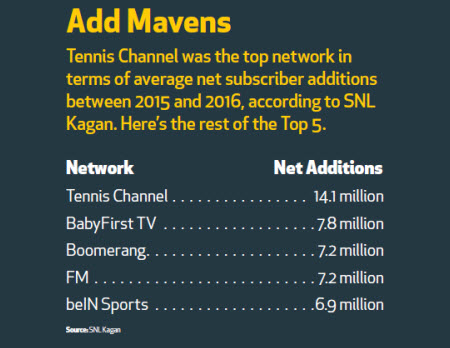Small Indie Nets: Meet My Big Brother
The smarter way to stay on top of the multichannel video marketplace. Sign up below.
You are now subscribed
Your newsletter sign-up was successful

Having a big brother can be a very good thing for an independent cable network.
The proof is in the numbers — all of the independents that showed the biggest gains in carriage over the past six months have been in some way connected to a much larger content provider or distributor, like ESPN, Comcast or Sinclair Broadcast Group.
Among indie networks, Sinclair’s Tennis Channel had the biggest gain in subscribers between 2015 and 2016, according to SNL Kagan, adding 14.1 million customers. In second place was BabyFirst TV, with an increase of 10.2 million customers.
Rounding out the Kagan list is Boomerang (7.2 milion), FM (7.2 million) and beIN Sports (6.9 million). BabyFirst is one of the minority-controlled networks launched by Comcast as part of the conditions surrounding the FCC approval of its purchase of NBC Universal. Boomerang is owned by Turner Broadcasting (Time Warner Inc.), FM is part of Fuse Media — which includes cable network Fuse and is owned in part by MSG Networks — and beIN Sports is part of beIN Media Group, which operates 34 channels in 33 countries.
The big brother trend was prevalent between 2014 and 2015 as well, according to Kagan, when SEC Network (launched by ESPN) added 38.8 million homes. That year BabyFirst came in second again, with 10.2 million additions. It was followed by Univision Deportes (part of Spanish-language broadcaster Univision Communications) with 8.5 million, Comcast-launched minority channel Aspire (owned in part by NBA legend Earvin “Magic” Johnson) and Fusion (owned by Univision Communications), each with 8.5 million additional homes.
‘A LITTLE BIT OF MUSCLE’
“Sinclair has a little bit of muscle,” Telsey Advisory Group media analyst Tom Eagan said regarding independent networks hooking up with larger companies. “Tennis Channel had very little leverage.”
The smarter way to stay on top of the multichannel video marketplace. Sign up below.
Tennis Channel was available in about 37 million homes in February, one month before it closed its deal to be purchased by Sinclair for $350 million. Five months later Tennis Channel said, on the eve of its coverage of the U.S. Open tennis tournament, it is available in 47 million homes and is on a path to grow that to 60 million by mid-2017.
Fueling that growth is its relationship with Sinclair, which has been one of the more aggressive broadcasters regarding retransmission-consent negotiations with distributors. With Sinclair’s added heft — it owns, operates or provides services to 173 stations in 81 markets — Tennis Channel has reached carriage deals with several additional distributors, including Charter Communications, Dish Network, Suddenlink Communications, Cable One and Frontier Communications.
Last month, on a conference call to discuss quarterly results, Sinclair executive vice president and chief operating officer David Amy said the Charter deal alone — which wasn’t expected to kick in until mid-August — would add about 1 million homes to Tennis Channel’s rolls.
Tennis Channel is carried on the expanded basic or digital basic packages on Bright House, Charter, Dish Network, Frontier, Suddenlink and Cable One, with similar rollouts planned in the months ahead for AT&T U-verse, Buckeye, Comcast, DirecTV, Mediacom Communications, Cincinnati Bell and WideOpenWest.
Other broadcasters have turned to creating their own pay TV channels to boost revenue and make their overthe- air content more compelling. Tribune Media converted former superstation WGN into WGN America in 2008 and began collecting cable-carriage fees for it in 2014, and Sinclair launched American Sports Network in 2014 and sci-fi network Comet TV in 2015.
Having that extra content doesn’t always translate into more carriage and heftier fees. Tribune found that out on June 13, when Dish Network declined to renew its Tribune retransmission-consent agreement covering 42 Tribune stations in 33 markets and including WGN America. That dispute was ongoing at press time. (Note: Dish and Tribune Media resolved their dispute and Tribune stations and WGN America were restored to Dish on Sept. 3.)
This article was updated on Sept. 8 to correct factual errors concerning the ownership of the Boomerang channel, the conversion of WGN into WGN America and a reference to the Ring of Honor wrestling program.
